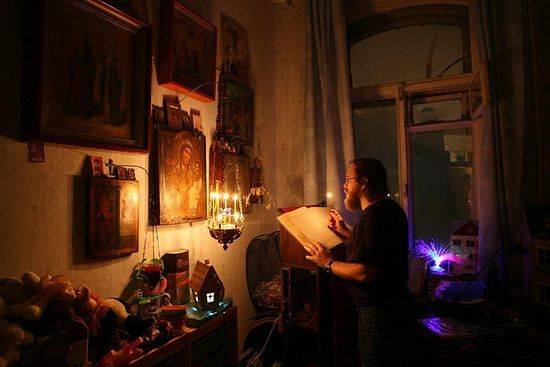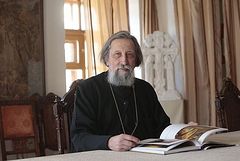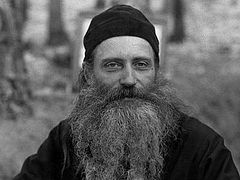To those on the new style calendar who are celebrating the Nativity of Christ, we wish all a joyous feast. Please keep this delightful article on fasting in mind for Wednesdays and Fridays, and the other three extended fast periods. But for those who are still observing the Nativity fast, may these instructions encourage you during this final stretch.
We have conducted a survey among our website’s (Pravoslavie.ru Russian) readers asking them if they fast. Over 2000 people took part in the survey and the results are the following: approximately one third of our readers (and we presume these are very religious people or at least sympathizers of Orthodoxy) keep the fast. And the rest 65 percent or so either do not keep the fast at all or do it with some relaxations in food.
We have asked Archpriest Oleg Stenyayev to remind us once more what fasting is, how it is connected with spiritual life of Orthodox Christians, and to give a piece of advice to those who are still hesitant about fasting—how to begin.
Prayer and fasting
First of all, fasting is something without which we will not be able to overcome the evil one’s forces; as the Bible says: Howbeit this kind goeth not out but by prayer and fasting (Mt. 17:21). Fasting strengthens our prayer and, as an action connected with our body, it weakens sinful desires of our body. Because it is difficult for people to lead a prayerful life and at the same time to ignore all the urges of body. Let us confess: often during our prayer our mind is wandering somewhere, we are thinking of something different, sometimes even something indecent. And we stop our thoughts and try to remember which prayer we are reading: to the Mother of God or to Christ? And we even turn over the page in order to look. It appears that we stopped praying at some point: sinful suggestions acted on us as a result of the weakening of the flesh. Fasting helps overcome it.
Fasting is the most favorable time for praying. Our soul is directly linked to our body, and, if the body is not under control (especially by prayer), it is an assault on the soul.
The soul needs training, endurance. This training is fasting, the support is prayer. Even the body becomes weak unless we do exercises and train it. There are so many people who go in for sports, go to gyms in order to be in good shape! But why don’t we have such a serious attitude about our soul?
When we eat only fasting food, we as if return to the state of Paradise. For, Adam and Eve ate only vegetable food in the Garden of Eden.
Food restrictions are vital. I will repeat myself: it is significant because the body, restrained by prayer, allows us to concentrate on prayer.
Fasting is a good time for other kinds of body “training” as well: when, for instance, spouses by mutual agreement decide to refrain from marital relations during the fast to exercise their prayer. Refusal of non-fasting food during this period helps much in that.
Reading the Holy Scripture is an important spiritual support during the fast
It is very important to read the Holy Scripture during fast as it gives a spiritual support. I try to read the whole Bible during the Nativity Fast and to read it twice during the Lent: both the Old and the New Testaments. I realize that it is extremely difficult to read the whole Bible during the fast time for those who have a job. Then choose only one part of it, for example the Gospels, and read them with due attention, maybe even with comments by the Holy Fathers. And next time – in the period of another long fast—read other Biblical books, very carefully and thoughtfully. So not only will fasting be a time for a spiritual exercise for us, but it will be a period of our spiritual education as well.
And one should not forget that there are daily Gospel and Epistle readings: and it is indicated in the calendars which part of the New Testament the Church reads on one or another day. These indications are not only for clergy, but also for laity. It is recommended to read the Gospel and the Epistle of the day every day right after the morning prayers. These are short pieces of reading and it will be very good if a believer meditates on the subject of the reading during the day.
Why else is it important to combine prayer with reading of the Word of God? If I just pray, then such a prayer may become a mere monologue and not rise higher than my ceiling. But if I combine reading of the Word of God with prayer, then it comes out that I ask God in my prayer, and He answers me through the Holy Scripture.
Relaxations in fasting
For whom do fast relaxations exist? Pregnant women, nursing mothers, prisoners and servicemen are exempt from fasting. Also there are fast relaxations for sick people: they discuss their diet with doctors and ask for their priests’ blessing.
Small children have a large number of relaxations in fasting – the Holy Fathers wrote about this. But it is necessary to remember that the relaxations concern only food. And if someone – either a pregnant woman or a serviceman – does not stop eating meat and milk foods at fast time, they should choose some other form of fasting for themselves. For example, they can abstain from watching shows, films, sports competitions…
As for children, here is an example from my own experience. Once a boy aged 6 or 7 came up to me and said: “I am not allowed to fast. But you say each of us should find his or her own form of fasting. What would you recommend me to do?” And I answered him: “Abstain from chewing gum.” We saw him chewing all the time in the church, and whenever we reprimanded him for that, the boy took his chewing gum out of his mouth, stuck it behind his ear and soon started chewing it again. I suggested that he give up chewing gum during the fast – and he did. It was a real trial for him – not to chew. We saw how difficult it was for him to cope with this task. I even asked the parishioners to support him by prayer. And the boy succeeded in this – he experienced true fasting. We were happy for him. We asked him: “Was it hard for you?” And he replied: “Yes, particularly at the beginning. Then it got easier; I drank water.”
Thus, if someone cannot observe the fast properly, it does not mean that he or she should not fast at all. We can always deprive ourselves of something for the sake of spiritual perfection.
By the way, fasting makes our meals joyful. If a person, for instance, eats only meat and dairy products, he or she no longer appreciates the taste of this food. But if a person does not eat them for the period of fast, then, when the fast is over, he or she can duly appreciate the taste of these kinds of food!
During the winter season our organisms get tired of heavy food, like meat, and the Nativity Fast and Great Lent help us in this enormously. And when we eat more vegetables and fruit during this period, we sleep better and our body gets rest. We no longer feel sleepiness during prayer. However, prayer combined with non-fasting food is difficult prayer.
Studying the Holy Scriptures in the period of fast is very different, too: it is easier for your mind to memorize the texts, you apprehend them figuratively, and your mind is not wandering during reading.
You say: “I cannot.” But have you ever tried? What if you can?
I would advise people who have never observed fasts properly: please, try! If a person tries, that is, enters the world of fasting, he or she will be able to form an opinion of it. Because you cannot reject the things of which you have absolutely no idea! You say: “I cannot”. But have you ever tried? What if you can?
Today we have many overwieght people, and I think many of them might keep the fast some extra days, not only during fasts. (Smiling). For some reason, many people are willing to keep very strict diets, when they are supposed to eat almost nothing, but at the same time these people, unfortunately, avoid fasting. Meanwhile, there are so many tasty and healthy fast dishes!
Sometimes it happens this way: one of my acquaintances did not keep fast during Lent, but suddenly resolved to fast during Bright Week, saying: “I have decided to keep a strict diet.” I asked him: “Why didn’t you make this decision during Lent?” “I don’t know. Actually I was about to begin, but something kept diverting me from this.” And I explained him that it was not “something” – these were living creatures, that is, evil spirits, who diverted his attention. The demons did their best to turn everything upside down. They suggest, “You may eat whatever you wish during Lent, but during Bright Week, when it is time to break your fast – keep a strict diet!
I would like to give advice to those who think they will not be able to “get through” the forty days of fast: begin to observe the fast on Wednesdays and Fridays during this Nativity Fast. And, nevertheless, try what the fast is about – make an effort to keep the strict fast for a week. And then, when you have a clear feeling of this lightness – in praying, in reading the Holy Scriptures – such a strong spiritual and quiet joy will come to you, that you will want to continue your fasting. Why not try? Since fasting is expression of your free will. Be brave! And you will see how good it is. You will feel how these restrictions and prayer, in combination with fasting, enrich your soul greatly.






Bless! This was an edifying article! As an insulin-dependent diabetic, I tried to keep the Nativity Fast this year but suffered repeated health problems. My wife also has had some health problems during the fast. We broke the fast a couple days ago in order to consume more protein -- and this has helped -- but my wife told me I need to humble myself and be willing to eat more high-protein grains (which I don't really like so much). Perhaps I can try more of these grains as our Nativity Feast gets closer -- or else during the Great Fast of Lent, 2016.
Please pray for us sinners!
Seraphim N.